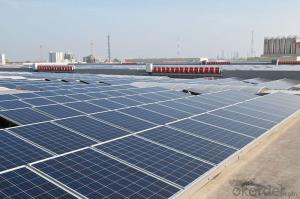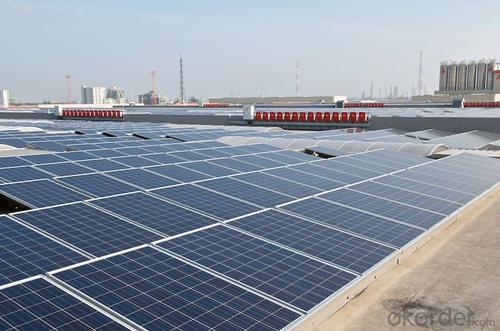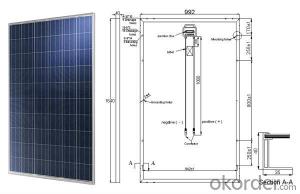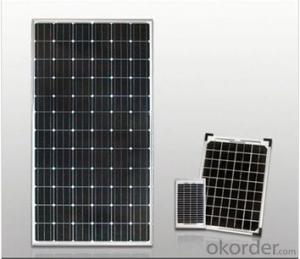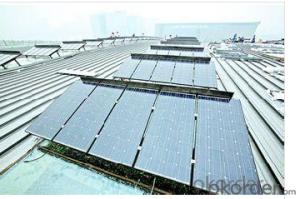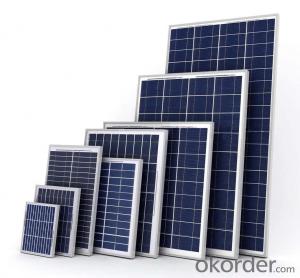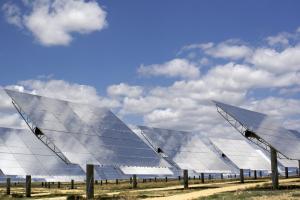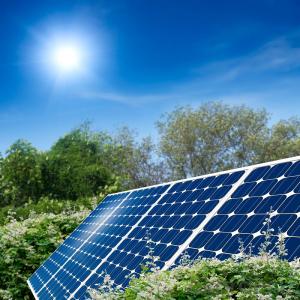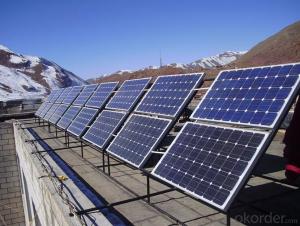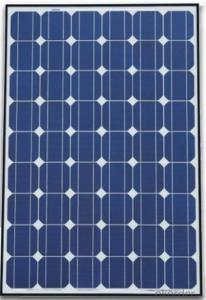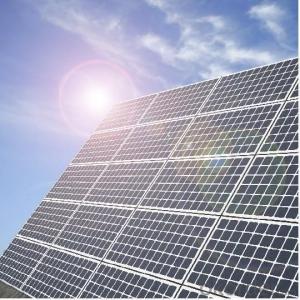Solar Panels Alaska - Polycrystalline Solar Panel 235W with High Quality
- Loading Port:
- Shanghai
- Payment Terms:
- TT OR LC
- Min Order Qty:
- 100 watt
- Supply Capability:
- 10000 watt/month
OKorder Service Pledge
OKorder Financial Service
You Might Also Like
Specification
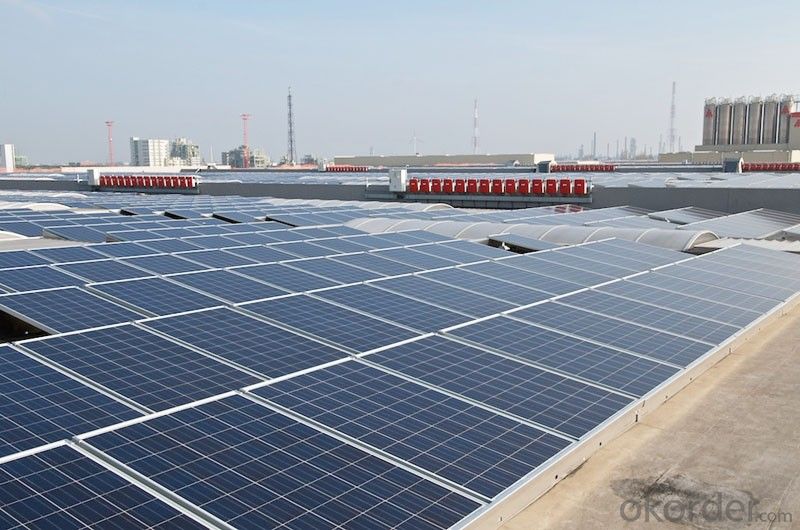
Product Description
235W Poly Crystalline Solar Panel
Product Highlights:
1. Guarantee positive power tolerance (0~+3%)
2. Module can bear snow loads up to 5400Pa and wind loads up to 2400pa
3. High performance under low light conditions (cloudy days, mornings and evenings)
4. Certified by Europe standards of TUV, IEC, CE and British MCS and AUS CEC
5. OEM/ODM available
Specs
| Electrical Characteristics | |
| Maximum Power [Pmax] | 235W |
| Power Tolerance | +/-3% |
| Maximum Power Voltage [Vmp] | 29.5V |
| Maximum Power Current [Imp] | 7.97A |
| Short-Circuit Current [Isc] | 8.59A |
| Open-Circuit Voltage [Voc] | 36.9V |
| Module Efficiency | 14.44% |
| Max. System Voltage | 1000VDC |
| Cell Size and Series | Poly 156*156 60pcs (6*10) |
| Temperature Coefficient of Pmax | - 0.47% / º C |
| Temperature Coefficient of Voc | - 0.33% / º C |
| Temperature Coefficient of Isc | 0.05% / º C |
| Mechanical Characteristics | |
| Dimension (mm) | 1640*992*40 |
| Frame | Anodized Aluminium Alloy |
| Glass | 3.2mm,High Transmission,Tempered Glass |
| Junction box & Cable | IP65 Rated weatherproof connectors Cable: TUV 1x4.0mm2 / UL12AWG,Length:900mm |
| Weight | 19.0Kgs |
Industry-leading Warranty:
Warranty on material and workmanship: 10 years
Guaranteed output of 90% after 12 years and 80% after 25 years.
- Q: Can solar panels be connected directly to motor?
- The sun is irradiated on the semiconductor p-n junction to form a new hole-electron pair. Under the action of the p-n junction electric field, the holes flow from the n region to the p region. The electrons flow from the p region to the n region, and the current is formed after the circuit is turned on.
- Q: I want to buy a solar panel from my house and I want to know how much it costs, what I have to buy and everything I need to know
- Guide okorder /
- Q: Can solar panels be used in areas with high levels of lightning activity?
- Yes, solar panels can be used in areas with high levels of lightning activity. However, it is important to ensure that the solar panel system is properly grounded and equipped with surge protection devices to mitigate the risk of damage from lightning strikes.
- Q: My family and I are looking into solar panels for our home. But I'm unsure how it would be priced. This month our home used ,623 kwh. The solar panel company said we should expect $6-$9 per watt used. What would that put as at?
- OK, KWH stands for Thousand Watts per Hour. You used ,623,000 watt/hours last month. If you pay $6.00 per watt, your bill would be $9,738,000.00. That's right-$9 million,seven hundred and thirty-eight thousand and 00/00.
- Q: 3.8 volts is required to fully charge a battery. But at 3.8 volts, the battery can be overcharged without the use of a controller correct? What if I don't care if the battery is fully charged? In the case of our family boat, I just installed a new radio, so I'm a little worried about power consumption. So now for the real question; If I hook a 2 volt panel to the batteries, do I need to worry about overcharging them? Or will the batteries stop the charging process once they reach 2 volt?I built the panel myself, it's 8 volts at 3.5 amps open circuit. I have tabs at every 3 volt increment on the panel so that I can use less voltage than 8 if I want to power something directly, (ex:2 volt radio)So I'm using the 2 volt tab at 3.5 amps(approx) for a total of approx 48 watts
- can I use a 2volt .5 amp solar panel on a 2 volt battery in a boat that i use for trolling motor and if I can can I leave it hooked up when using the trolling motor ? Plus how long would it take to charge a half drain battery with this panel??
- Q: Can solar panels be used in areas with high levels of wind-blown debris?
- Yes, solar panels can be used in areas with high levels of wind-blown debris. However, it is important to choose durable and robust solar panels designed to withstand such conditions. Regular cleaning and maintenance might be required to ensure optimal performance and longevity in these environments.
- Q: I am doing a science fair project on solar panels, and I need four solar panels to conduct the experiment. I would only need the solar panels for a week. What type of solar panel should I get?
- If okorder / for some ideas.
- Q: And how do you choose the best one for the best price?I saw a 400 watt monocrystalline solar panel
- In regards to my research about these two types of Solar Panels, I suggest that the Monocrystalline Solar Panel would be great! It is affordable and also more convenient to install. Using a 400W Panel means fewer panels and less installation time, in addition to fewer connections and transmission losses which results in big savings and a faster return on your investment.The Topsun Solar Panels boasts efficiency of up to 6.77% and use cutting edge technology for the best heat dissipation in the industry.
- Q: Still researching for a car that fully uses solar power energy, suggestions would be nice to.
- Solar okorder /
- Q: if you know the area of the panel can u calculate for the wattage or voltage of the panel..
- You need to know how many solar cells are in the panel and what is the rated current each cell will produce. This information should be listed on the panel. Each cell will produce from 0.5 to 0.55 volts DC per cell and each cell will produce a current that is dependent on the size of the cell and the type of material the cell is made from. If the cells are connected in series then the voltage of each cell will add together, that is if you have 30 cells connected in series they should generate about 5 to 6.5 volts DC. If each cell generates .2 amps, then you multiply the voltage of 5 volts DC times .2 amps DC equals 8 watts of power. The current of each cell does not add together when you connect the cells in series only the voltage of each cell. If you connect the 30 cells in parallel then the current of each cell adds together but the voltage of each cell does not. That is 0.5 Volts DC times 36 amps equals 8 watts. The power (watts) produced will be the same. See our blog on the products page to see how to connect solar cells in series and in parallel. We also have a PDF file of solar cells and their rated output current sorted by watts per area and their manufacturer.
Send your message to us
Solar Panels Alaska - Polycrystalline Solar Panel 235W with High Quality
- Loading Port:
- Shanghai
- Payment Terms:
- TT OR LC
- Min Order Qty:
- 100 watt
- Supply Capability:
- 10000 watt/month
OKorder Service Pledge
OKorder Financial Service
Similar products
Hot products
Hot Searches
Related keywords
